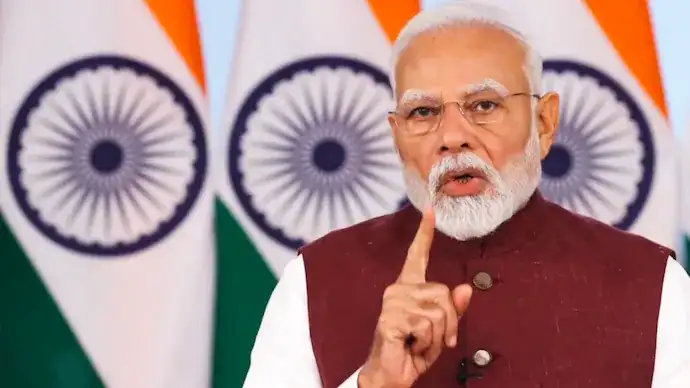India Refuses to Bow to Nuclear Threats, Says PM Modi
In a strong and clear message, Prime Minister Narendra Modi declared that India will no longer stay silent in the face of nuclear intimidation or state-sponsored terrorism. Speaking at a high-level security conference, he stated, “India will not tolerate any form of nuclear blackmail,” signaling a bold shift in India’s security and diplomatic posture.

Terrorism and Its Enablers Will Be Treated the Same
PM Modi emphasized that India no longer views terrorists and the governments that support them as separate. “That era is over,” he said. “Those who provide shelter and resources to terrorists will be treated the same as those who commit the crimes.”
This shift moves away from the traditional global narrative, which often separated non-state actors from their state sponsors. Now, India insists that both must be held equally responsible.
Operation Sindoor Unmasks Pakistan’s Intentions
Citing the recent Operation Sindoor, PM Modi drew attention to the disturbing role played by Pakistan in promoting terrorism. Indian forces successfully neutralized several high-ranking extremists during the mission. However, what followed revealed even more troubling truths.
Senior Pakistani military officials were seen attending the funerals of those eliminated in the operation. According to PM Modi, this act openly confirmed state involvement. “Their presence at those funerals speaks volumes,” he noted. “It proves the deep connection between the Pakistani military and terror networks.”
Instead of staying silent, Modi urged the world to acknowledge this reality. He called on global powers to take decisive steps and stop offering diplomatic cover to such regimes.
India Will No Longer Be Intimidated
Without naming Pakistan directly, PM Modi took a sharp dig at nations that use nuclear weapons as a shield for illegal actions. He asserted that India won’t remain passive out of fear. “Owning nuclear arms doesn’t give any country the right to support terrorism,” he declared. “India does not issue threats, but we won’t be threatened either.”
This declaration marks a significant evolution in India’s defense strategy. It reflects a growing confidence in India’s capabilities and a readiness to act decisively if provoked.
Global Community Must Stop Looking Away
Throughout his speech, Modi pushed for stronger international cooperation against terrorism. He criticized the global community for ignoring the role some countries play in nurturing extremists. “Symbolic condemnations are not enough anymore,” he said. “Real consequences must follow.”
He added that terrorism can no longer be seen as a regional issue. “What seems distant today could impact your nation tomorrow. That’s why we must work together to eliminate it,” he explained.
Furthermore, he called out countries that avoid taking a stand for political convenience. “Selective silence helps no one. It only encourages those who thrive in chaos,” Modi warned.
India’s Stand Gains Support at Home and Abroad
Strategic analysts and former defense officials welcomed Modi’s firm approach. Many agree that India has long needed a more proactive and uncompromising strategy when dealing with cross-border threats.
“Modi’s message is both timely and necessary,” said retired Army General A.K. Sinha. “It signals to our adversaries that India is no longer willing to be reactive.”
Public sentiment also favors this new doctrine. After suffering multiple terror attacks over the years, citizens want stronger action and accountability from those involved in cross-border aggression.
Strengthening Global Partnerships
Alongside its internal policy changes, India is actively expanding its international security partnerships. Modi mentioned that India is working closely with like-minded nations to improve intelligence sharing, cyber defense, and coordinated counterterrorism efforts.
“We’re not alone in this fight,” he stated. “The world faces a shared threat, and India is ready to play its part in defeating it.”
India has already increased its participation in global military exercises, signed new defense agreements, and strengthened its presence in regional security forums. These efforts align with India’s broader goal of becoming a central player in global peacekeeping and strategic stability.
Redefining India’s Security Policy
Modi’s words are more than just a warning—they reflect a deeper transformation in India’s national security framework. For decades, India followed a largely defensive approach. Now, that is changing.
The government is focusing on deterrence through strength, clarity, and proactive diplomacy. It wants the world to recognize that nuclear weapons cannot serve as a cover for aggression or extremism.
Conclusion: A Nation That Will No Longer Be Silent
Prime Minister Modi’s powerful message made one thing absolutely clear: India will protect its people, its borders, and its sovereignty—no matter what threats come its way. By rejecting nuclear blackmail and calling out those who enable terrorism, India is reshaping the conversation around global security.
“We want peace,” Modi concluded. “But peace cannot come at the cost of ignoring terrorism. India will rise, India will respond, and India will lead.”






